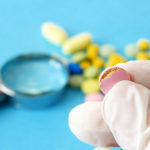By Bonnie Jenkins, Advanced Natural Wellness
In the past, I’ve told you how homocysteine can elevate your risk of having a heart attack. But unhealthy homocysteine levels can also boost your chances of suffering a stroke. However, two new studies show that the same nutritional tactics used to tame homocysteine-related heart problems can also lower your risk of stroke.
Homocys-What?
Homocysteine is the normal breakdown product of the essential amino acid, methionine. Although the body uses small amounts of homocysteine, high levels in the blood can boost LDL cholesterol levels. Homocysteine also irritates the arteries and makes the blood clot more easily than it should, increasing the risk of blood vessel blockages. To make matters worse, homocysteine prevents the small arteries from dilating, so they’re more vulnerable to obstruction.
When are homocysteine levels too high? A growing number of studies show that a homocysteine level greater than 9 μmol/L is a risk factor for heart disease independent of other known risk factors like cholesterol. In one study of 83 patients at Queen’s University in Belfast, Ireland, researchers found that moderate elevations of homocysteine—about 13 μmol/L and higher—are associated with a more than five-fold increase in the risk for stroke. If that weren’t bad enough, the Queen’s team also found that high levels of homocysteine almost tripled the risk for Alzheimer’s disease.
So, what increases homocysteine? It could be caused by genetic enzyme deficiencies, low levels of folic acid, vitamin B6 and vitamin B12, hypothyroidism, or certain medications. For example, glucophage, used to treat diabetes, and cholestyramine, used to treat high triglycerides, block the absorption of folic acid from the intestines and raise blood levels of homocysteine. Lifestyle factors also play a role, since smoking and caffeine can increase your homocysteine levels. Unfortunately, even if you don’t have any other risk factors, homocysteine levels also rise naturally as you get older.
Open your arteries, improve blood flow for a new health miracle...
Did you know your circulatory system has over 60,000 miles of arteries, veins and other blood vessels, if stretched end to end?
But as you age, your blood vessels undergo changes, which may cause them to stiffen, thicken and get clogged.
GOOD NEWS! Doctors have now identified a “Miracle Molecule” inside your arteries that helps OPEN your arteries and IMPROVE blood flow.
It’s what Dr. Valentin Fuster calls it, "One of the most important discoveries in the history of cardiovascular medicine."To you, that means...
- Healthy blood pressure
- Sharper mind and memory
- Skyrocketing energy and muscular strength
- Increased pleasure and passion in the bedroom
- Improved circulation to every cell and organ in your body
Go here to discover a new natural way to significantly boost the levels of this miracle molecule in YOUR body NOW!
B Healthy
So, that’s the bad news. But, as I mentioned earlier, a new study presented at the American Stroke Association’s 29th International Stroke Conference found that folic acid and other B vitamins help break down homocysteine in the body, reducing the risk of stroke. Researchers from Canada’s University of Toronto and McMaster University analyzed the results of a five-year research trial that randomly assigned 5,522 adults with heart disease to either take a placebo or a daily regimen of 2.5 mg. of folic acid (vitamin B9), 50 mg. vitamin B6 and 1,000 mcg. of vitamin B12.
The study found that people who already suffer from cardiovascular disease can also reduce their risk of stroke with this daily regimen, especially if they’re under 69 years of age. During a five-year follow-up period, stroke occurred in 258 of the participants (about 5 percent). The risk was lower in those who followed the vitamin regimen. The average homocysteine concentration decreased by 2.2 micromol/L in thevitamin therapy group and increased by 0.80 micromol/L in the placebo group.
Those who benefited the most from the vitamin treatment included people:
• younger than 69
• with higher cholesterol and homocysteine levels at the start of the study
• from areas where folic acid-fortified food isn’t available
• who weren’t receiving anti-platelet drugs (like Plavix) or cholesterol-lowering statins at the start of the study
Are You Suffering From...
- Love handles and a pot belly
- Romance that isn't what it used to
- Forgetfulness and inattention
- Low (or no) strength and endurance
- A sex drive that's shifted into neutral...or worse
If so...you may have Mature Male Burnout. Click here to discover more about this unique condition and what you can do about it.
More May Be Better
In another new study, researchers at the University of California, Los Angeles, started out asking whether the reduction of homocysteine levels with B vitamin supplementation reduces the progression of atherosclerosis in healthy subjects.
In a double blind clinical trial, 506 healthy participants between 40 and 89 years of age were given either a placebo or a high-dose B vitamin with 5 mg. folic acid, 0.4 mg. vitamin B12, and 50 mg. vitamin B6. The researchers measured the thickness of the participants’ carotid, aortic, and coronary arteries and found that, after three years, the B vitamin group had a statistically significant lower carotid artery thickness than the placebo group.
The researchers concluded that high-dose B vitamin supplementation significantly reduces the progression of early-stage atherosclerosis in individuals who eat well and are at low risk for cardiovascular disease. This is encouraging news if you want to reduce your risk of stroke.
One Last Thing …
So, how much of these homocysteine-lowering nutrients should you take? You need to take 800 to 1,000 mcg. of folic acid, along with at least 50 mg. of vitamin B-6 and 500 to 1,000 mcg. of B-12 each day to effectively battle high levels. Look for a B-complex supplement that combines all three. For better absorption, opt for a sublingual form (which is dissolved under the tongue).
You can also boost your Bs every time you eat. B6 can be found in fortified cereal, bananas, and garbanzo beans. Meat and fish, especially salmon and lean beef, are good sources of vitamin B12. And folic acid (known as folate in food) is abundant in spinach, asparagus, lentils, beans, and rice. Not only are these super-nutritious foods, they are also extremely affordable—a boon during these tough economic times.
Research Brief …
It’s no secret that obesity has reached epidemic levels and that being overweight can negatively impact your health and self-esteem. But if you carry that weight around your middle, you may have even more problems to worry about, especially if you are already at risk for cardiovascular disease.
According to new research, the bigger your waist, the higher your risk of developing heart failure. Researchers at Beth Israel Deaconess Medical Center in Boston analyzed data from nearly 80,000 women and men age 45 to 83. They discovered that those with larger waists had a higher incidence of heart failure—a condition in which an insufficient amount of blood is pumped from the heart, allowing fluid and blood to back up into the lungs and/or a buildup of fluid in the feet and legs.
The researchers discovered that, in women and men with a body mass index (BMI) of 25 (the lowest end of the overweight range), a waist circumference increase of 10 centimeters (cm) was linked to a 15 and 16 percent higher risk of heart failure, respectively. Larger waist size reflects the presence of a higher amount of abdominal (visceral) fat, which surrounds the internal organs and has been linked to higher risks of cardiovascular disease and type 2 diabetes.
Unfortunately, there aren’t any quick fixes to reduce your risk. Cutting calories and getting at least 30 minutes of aerobic exercise five days or more per week is the only way to truly drop the pounds and change the odds in your favor. If you are overweight and are at an increased risk of heart disease, you may get some additional protection with hawthorn extract while you adopt healthier fitness habits.
References:
Hodis HN, et al. High-dose B vitamin supplementation and progression of subclinical atherosclerosis: a randomized controlled trial. Stroke. 2009;40:670-671.
Levitan EB, et al Adiposity and incidence of heart failure hospitalization and mortality: a population-based prospective study. Circulation: Heart Failure 2009; DOI: 10.1161/CIRCHEARTFAILURE.108.794099.
McIlroy SP, et al. Moderately elevated plasma homocysteine, methylenetetrahydro-folate reductase genotype, and risk for stroke, vascular dementia, and Alzheimer disease in Northern Ireland. Stroke. 2002;33:2351-2356.
Saposnik G, et al. Heart Outcomes Prevention Evaluation 2 Investigators. Homocysteine-lowering therapy and stroke risk, severity, and disability: additional findings from the HOPE 2 trial. Stroke. 2009;40:1365-1372.






